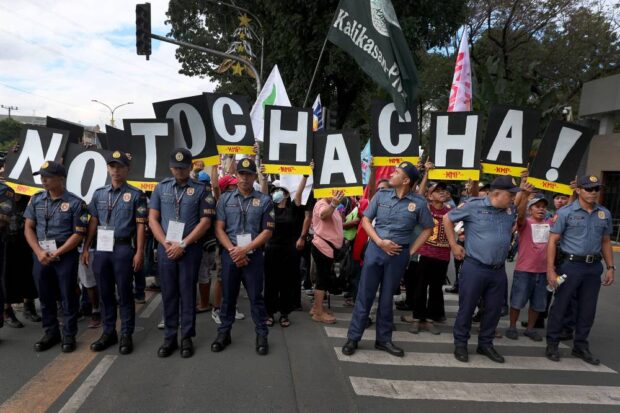Cha-cha still a sound decision despite public dislike – solon

OUTCRY Policemen are on standby as groups allied with the Bagong Alyansang Makabayan stage a protest in front of the House of Representatives in Quezon City on Monday to condemn what they call the “self-serving” Charter change initiative promoted by leaders of the chamber. — File photo from GRIG C.MONTEGRANDE
MANILA, Philippines — The push for amendments to the 1987 Constitution’s economic provisions should continue even as a recent survey showed that many Filipinos do not support moves seeking a Charter change, Cagayan de Oro 2nd District Rep. Rufus Rodriguez said on Thursday.
According to Rodriguez, it may be unpopular now, but many government officials and business leaders believe easing economic restrictions would benefit the country.
“The national leadership, beginning with President Ferdinand ‘Bongbong’ Marcos Jr., believes that changing the restrictive economic provisions of the Constitution would benefit the country as it would result in more foreign investments coming in,” he said.
The lawmaker heads the House of Representatives committee on constitutional amendments.
“The right decisions are not always popular,” he added in a statement.
Rodriguez was referring to a recent Pulse Asia survey on Charter change, where 88 percent of the 1,200 respondents said the 1987 Constitution should not be touched at this time.
Only 8 percent agreed with calls to amend the Constitution.
READ: Pulse Asia: Most Filipinos don’t think now is the right time for Cha-cha
Last March 20, the House passed on the third reading Resolution of Both Houses (RBH) No. 7, which seeks to amend the 1987 Constitution by easing the restrictive economic provisions.
READ: House approves RBH 7 on third reading
If the House and the Senate make no changes, and if it is ratified in a plebiscite, three provisions would be amended by adding the phrase “unless otherwise provided by law:”
Section 11 of Article XII (National Patrimony and Economy), where the phrase “unless otherwise provided by law” is inserted in the provision that bars foreign ownership of a public utility, shall, except in a case where 60 percent of the total capital belongs to Filipino citizens;
Section 4 of Article XIV (Education, Science and Technology, Arts, Culture, and Sports), where the phrase “unless otherwise provided by law” is inserted in the provision that bars foreign ownership of basic educational institutions except in a case where 60 percent of the total capital belongs to Filipino citizens;
Section 11 of Article XVI (General Provisions), where the phrase “unless otherwise provided by law” is inserted in two portions: First, the provision that bars foreign ownership in the advertising industry except in a case where 70 percent of the total capital belongs to Filipino citizens; and in the provision that limits foreign investors participation in entities to how much their capital share is.
This means that if RBH No. 7 is ratified, Congress can decide the percentage of foreign ownership in companies in the public utilities, basic education and advertising sectors.